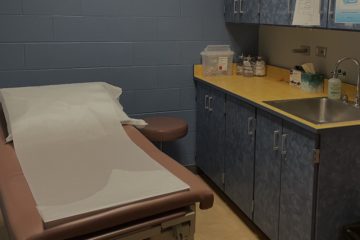
My name is Caroline Lego, and my group members— Lauren Gould, Bethany Welch, and Lia Schaarschmidt— and I had the incredible opportunity to work with Think Kids on their Trauma-Informed Schools Project, a part of their Supporting School Wellness Project. We are seniors in the Undergraduate Social Work Program at West Virginia University, working on increasing our knowledge of macro social work practices and child welfare. Through this project, we learned about the resources and services schools offer to support their students by disseminating surveys to over 50 counties in West Virginia.
Children in West Virginia experience a variety of disparities leading to trauma, such as loss, neglect, abuse, homelessness, domestic violence, etc. This trauma can drastically impact their learning abilities as it changes how the brain function. When schools do not know how to handle trauma, it can lead to increased absences, dropouts, and adverse behavior. Therefore, being trauma-informed is an absolute necessity in schools. To be trauma-informed, includes recognizing and responding to traumatic stress’s behavioral, emotional, relational, and academic impact on students. A successfully trauma-informed school will foster a climate where students feel safe and confident in their learning ability, leading to lasting resilience.
The survey we disseminated included questions regarding mental health resources, parent resources, after-school programs, the Handle with Care Program, and discipline. Of the 98 participants who completed the survey, 78% identified their school as being trauma-informed and indicated various services their county has, in and out of the school setting. Services included counselors, social workers, crisis intervention teams, mental health training, trauma care, and much more.
The survey responses also indicated that there are many flaws and inconsistencies within their services. The most shocking flaws were found within one of the most important aspects, the Handle with Care Program, where many did not know if it was implemented, did not follow through, or had uncooperative law enforcement. We also saw a major lack of parent resources and support in the results, although some mentioned they are attempting to initiate programming to address this.
One thing that struck me the most was that in almost all of the questions, multiple responses stated, “not sure,” “sometimes,” “I think so,” and “I don’t know,” even from participants who considered their schools trauma-informed. Being a trauma-informed school includes working as a system, and having multiple uncooperative and unknowledgeable people, including cooperative partners, can heavily impact a child’s outcome. When we are educated on how to help children affected by trauma, we can greatly increase their ability to succeed academically, form healthy connections, and minimize/prevent trauma. After analyzing the results, we believe it would be interesting and beneficial to take a further step and investigate various factors/demographics from the counties that responded. From this, we could see if their methods of practice are making a positive impact on a variety of aspects within children’s lives and use these beneficial practices to help educate and improve other counties in West Virginia.
We hope to see schools around the state develop a seamless practice in helping children affected by trauma. As well as providing resources and support for struggling children and their families



1 Comment
Educator in WV · December 7, 2022 at 10:50 pm
I love this idea but the recent change in the Superintendent at the State level believes we should only be focusing on reading, math, and writing.
Schools will not be supported to take on these initiatives.
Where is the responsibility on State agencies to provide behavioral health services to families and communities? Our communities and hospitals do NOT have enough social workers, therapists, or counselors to support the community need and schools can’t be the educational institution and mental health facility. Teachers are not trained in mental health and do not have influences over family dynamics – this is where children can receive all around support (trauma informed schools AND family therapy/addiction support). We often lose students at school because the home influence does not support coming to school in our most at-risk populations. Not to mention adding these duties onto our already over-extended and short staffed teacher population.
Good research to get us started though!